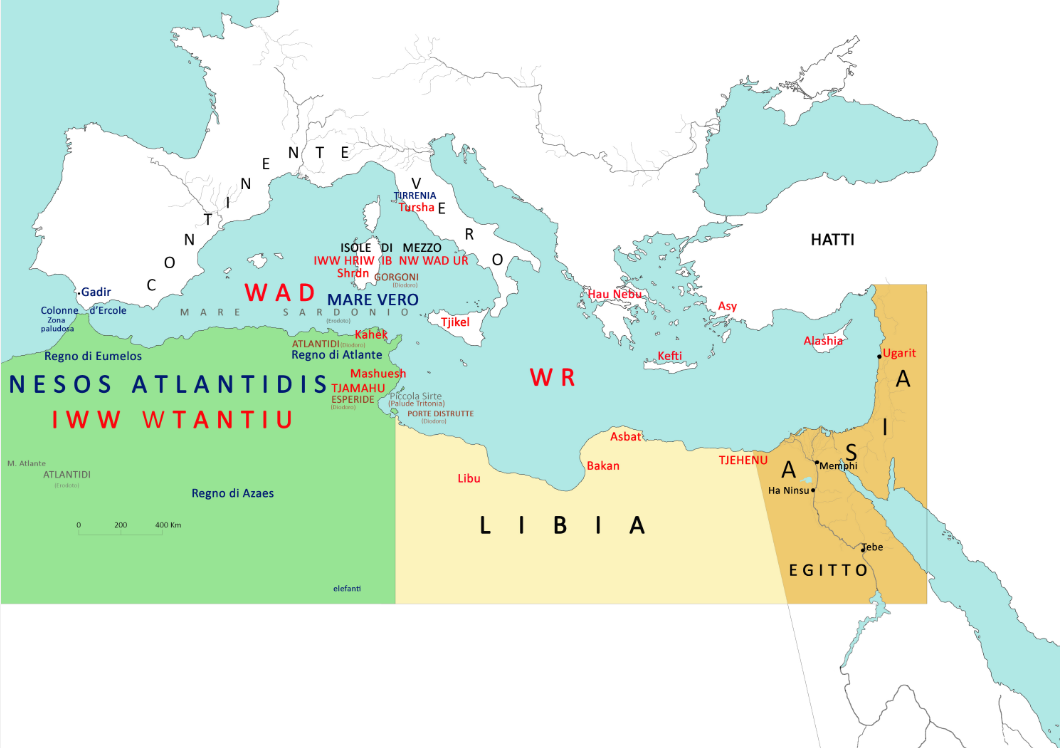Tunisia
Bisceglia, Carlos Alberto
Carlos Alberto Bisceglia is the author of Atlantis 2021 – Lost Continent Discovered [1895]. He has several other books currently being translated from their original Italian.
Bisceglia’s central claim is that Atlantis was situated on an ‘island’ in northwest Africa. He claims “that the ‘geographical coordinates’ left by Plato indicate that the empire of Atlantis included the regions enclosed by Mauritania, Morocco, Algeria, and Tunisia, the adjacent islands, and possibly southern Spain.” He further claims that this territory was known to the Egyptians as ‘Ma’, being an abbreviation of Meshwash!
The African Humid Period which ended between 6,000 and 5,000 years ago, saw North Africa as home to some very extensive river systems and huge lakes. In what is now Western Sahara, the Tamanrasset River flowed from the Atlas Mountains southward and then west to the Atlantic. This creates a virtual ‘island’ enclosing the Atlantean territory delineated above, leaving a relatively small ‘isthmus’ in the Atlas mountains between the Mediterranean and the source of the river.
A comparable claim was made by Michael Hübner in 2008, when he described the Souss-Massa plain of Morocco as an island, surrounded as it is by mountains and called ‘island’ by the native Amazigh people!
I did not find Bisceglia’s claim convincing. His insistence that the Atlantis war took place 9,000 years before Solon, millennia before Athens even existed and certainly well past the African Humid Period is, for me, untenable. His book lacks focus and could have been fruitfully edited to half its size. Having described his Atlantis, he wanders off all over the world to Göbekli Tepe, Gunung Padang, Nan Madol along with many other places, all interesting, but without any real connection to Atlantis in NW Africa. He names the Richat Structure along with the 50km distant Semsiyat Dome as the capital(s) of Atlantis! According to Bisceglia, the larger structure (Richat) was reserved for the deity, the smaller one (Semsiyat) for his ‘people’!
Nevertheless, Bisceglia offers a pathetic explanation as to why his chosen Atlantis location is not submerged by suggesting that his Land of Ma was confused with the Land of Mu (Sundaland) in the Pacific and that the two separate accounts ‘were merged into one’. He adds “how the Egyptian priests knew this is a mystery. Evidently, some survivors from Sundaland arrived in some way in Egypt”
>However, Bisceglia made one simple but highly pertinent comment – “If Plato had thought that Atlantis was an island located in what we today call the Atlantic Ocean, he would have written that his Atlantis was ‘in the Middle of Okeanos’.” For the Greeks of Plato’s time, Okeanos referred specifically to the great river that encircled the known world. Instead. he placed Atlantis in the Atlantic Sea, which in my opinion brings us back to the Mediterranean.
In 2022, Bisceglia’s entire book was plagiarised under the name of Annabel Caras and is still (8th May 2023) on sale at Amazon.<
Zhang, Holden (Hong-Quan)
Holden (Hong-Quan) Zhang has a PhD in Fluid Mechanics and joined the University of Tulsa in 1998. In 2019, he published Revive Eden: Green Sahara Now. [1925] which investigates the disappearance of the Green Sahara and the possibility of reversing that event, not just in the Sahara, but in other desert regions also. In chapter nine of the 2nd edition of his book, he outlines his Atlantis theory.
Additionally, he recently published a YouTube video(a), in which he places Atlantis in what are now the chotts of Tunisia and Algeria. Although Zhang endeavours to present this as a new idea, it is not. In fact, it has been around for about a century, with continuous support ever since.
Zhang claims that his theory matches Plato’s description of Atlantis 100%! Wrong again; Plato clearly states twice (Tim.25a-b & Crit.114c) that Atlantean territory included some of North Africa along with part of southern Italy as well as a number of the islands in the Central Mediterranean region. So, in my opinion, Zhang is only partly correct regarding the extent of Atlantean territory. Nevertheless, I think he has made a useful contribution to the Atlantis debate.
A full written outline of Zhang’s theory is also available online(b).
I was amused to read in the same 2021 paper that Zhang wrote as follows about Aristotle’s description of the Atlantic Sea,
“This is not a description of the Atlantic that we know, which is not shallow, calm or lying in a hollow and which he refers to as a ‘sea,’ not an ‘ocean’.”
In 2018, on page 158 of Joining the Dots, I wrote;
“This is not a description of the Atlantic that we know, which is neither shallow, calm nor lying in a hollow and which Aristotle also refers to as a ‘sea’ not an ‘ocean’.”!!!!!
A further paper by Zhang was published in 2022 in support of his theories. This time he used details from ancient Egyptian Pyramid Texts.(c) >Zhang offers a video to accompany the paper(d).<
(a) Revive Eden 3 Convincing Atlantis – YouTube
(b) https://medcraveonline.com/IJH/is-atlantis-related-to-the-green-sahara.html
Maghreb, The
The Maghreb is a region of northwest Africa comprising the plains and the Atlas Mountains of Morocco, Algeria, and Tunisia. The term sometimes includes Libya and/or Mauritania and in ancient times also encompassed Moorish Spain.
See: The Atlas Mountains
Idjennaden, Bob (m)
Bob Idjennaden is a Belgian author now living in Ireland, working in the field of business organisation. 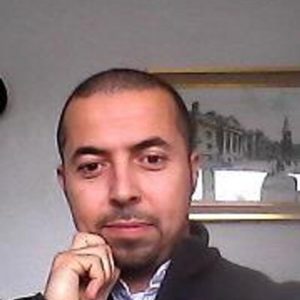 His private interests include the study of North African prehistory and history. This has led to the writing of a series of short books, sometimes with co-authors, which deal with specific aspects of North African history and culture.
His private interests include the study of North African prehistory and history. This has led to the writing of a series of short books, sometimes with co-authors, which deal with specific aspects of North African history and culture.
*[An article on the tribes of the Roman province of Africa Proconsularis, centred around modern Tunisia should be read(b) in conjunction with Idjennaden’s work.]*
I am not aware of Idjennaden touching on the subject of Atlantis, in spite of the fact that Plato clearly states that the Atlanteans controlled Libya as far as Egypt. Nevertheless, many of the books deal with specific matters related to different Atlantis theories, such as the Sea Peoples[1195] , the Canary Islands and Berbers.
(a) https://www.amazon.co.uk/Bob-Idjennaden/e/B0079G2BM8
(b) https://melitainsula.blogspot.ie/2010/10/indigenous-tribes-of-africa.html
Ugas, Giovanni *
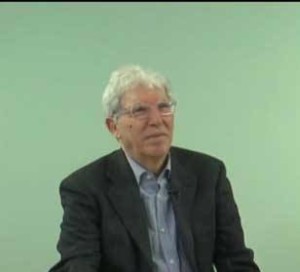 Giovanni Ugas is an archaeologist at the University of Cagliari, Sardinia, who has written extensively about the Shardana, their name, origin and language(c). The Shardana are usually counted as one of the Sea Peoples.
Giovanni Ugas is an archaeologist at the University of Cagliari, Sardinia, who has written extensively about the Shardana, their name, origin and language(c). The Shardana are usually counted as one of the Sea Peoples.
He has also touched on the subject of Atlantis, describing it as “a fabulous story with a political message, but this does not preclude the existence of a physical and historical substratum on which the myth is built. The task of tracing the shreds of history and geography of this story is fraught with pitfalls.”
Ugas places Atlantis in northwest Africa across Morocco, Algeria and Tunisia and has concluded that in the second millennium BC, the Atlanteans joined forces with the Sea Peoples to attack Egypt.
He also claims that the Mediterranean coast of southern Spain and France, along with the Italian peninsula was the ‘true continent‘ referred to by Plato (Timaeus 25a).
(a) L’Isola del continente: L’Atlantide tra fantasia e storia (1) [di Giovanni Ugas] | Sardegna Soprattutto (archive.org) (Italian) *
(c) SP INTERVISTA>GIOVANNI UGAS: SHARDANA – Sardinia Point (archive.org)
Tuttle, Robert J.
Robert J. Tuttle (1935- ) is an American nuclear engineer and the author of The Fourth Source: Effects of  Natural Nuclear Reactors[1148], which is a ground-breaking review of “how the effects of nature’s own nuclear reactors have shaped the Earth, the Solar System, the Universe, and the history of life as we know it.”
Natural Nuclear Reactors[1148], which is a ground-breaking review of “how the effects of nature’s own nuclear reactors have shaped the Earth, the Solar System, the Universe, and the history of life as we know it.”
This large volume (580 pages) challenges many accepted theories, such as glaciation, evolution, and mass extinctions and offers new ideas that will undoubtedly raise eyebrows(a).*The first 25 pages can be downloaded as a free pdf file.*
Surprisingly, Tuttle also tackles the question of Atlantis (p.301) suggesting the possibility that when sea levels were lower, the Balearic Islands in the Western Mediterranean were more extensive and possibly the home of Atlantis. He takes issue with Bury and Lee who refer to the ‘Atlantic Ocean’, which he claims should read as the ‘Sea of Atlantis’ and locates the ‘Pillars of Herakles’ somewhere between Tunisia, Sicily and the toe of Italy.
*(a) https://www.universal-publishers.com/book.php?method=ISBN&book=1612330770*
Two Crops a Year
Two Crops a year is one of the characteristics of Atlantean agriculture according to Plato (Critias 118e).
The North African climate was slightly wetter at the time of Hannibal (2nd & 3rd cent. BC), later, Algeria, Egypt and particularly Tunisia, were the ‘breadbasket’ of Rome(b) and may also have been so for the Atlanteans who earlier had control from North Africa to Tyrrhenia! Even today well-irrigated plains in Tunisia can produce two crops a year, usually planted with the autumnal rains and harvested in the early spring and again planted in the spring and harvested in late summer. The Berbers of Morocco produce two crops a year—cereals in winter and vegetables in summer(a).
It is worth noting that Mago, the Carthaginian author of a 28-book work on the agricultural practices of North Africa. had his books brought to Rome after the destruction of Carthage in 146 BC, where they were translated from Punic into Latin and Greek and were widely quoted. It is clear that Mago’s work was a reflection of a highly developed agricultural society in that region, a description that could also be applied to Plato’s Atlantis!
Although two crops are possible annually in other parts of the world, I must emphasise that North Africa is the only part of the Atlantean territory referred to by Plato (Timaeus 25b) that was so productive and continued to be so until the Romans, who depended on it along with Egypt to feed Rome.
>James Bailey who advocated an American location for Atlantis refers [150.63] to the irrigation systems of ancient Mexico and the ability to raise three crops a year in Mexico and the coastal plains of Peru as all echoes of Plato’s description of Atlantis.<
Bradford, Ernle
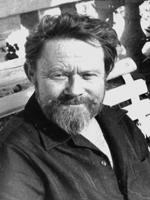 Ernle Bradford (1922-1986) served in the Royal Navy during the Second World War, after which he settled in Malta. He then undertook the task of retracing the route taken by Ulysses starting from Troy and recounted in his book, Ulysses Found[1011].
Ernle Bradford (1922-1986) served in the Royal Navy during the Second World War, after which he settled in Malta. He then undertook the task of retracing the route taken by Ulysses starting from Troy and recounted in his book, Ulysses Found[1011].
He made only one passing reference to Atlantis (p.57) which may be of interest to supporters of a Central Mediterranean Atlantis. When discussing the Egadi Islands off the west coast of Sicily he describes Levanzo, the smallest of the group as being “once joined to Sicily, and the island was surrounded by a large fertile plain. Levanzo, in fact, was joined to more than Sicily. Between this western corner of the Sicilian coast and the Cape Bon peninsula in Tunisia there once lay rich and fertile valleys-perhaps, who knows, long lost Atlantis?”*This would seem to be close the views of Alberto Arecchi and others.*
Kerkenna
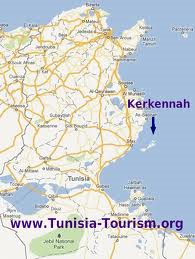 Kerkennah is the name of a group of Tunisian islands situated off its east coast.*The archipelago is one of the locations claimed to include Homer’s ‘Island of Goats’ and the home of the Cyclops in the Odyssey.*
Kerkennah is the name of a group of Tunisian islands situated off its east coast.*The archipelago is one of the locations claimed to include Homer’s ‘Island of Goats’ and the home of the Cyclops in the Odyssey.*
In a recent book[980] by Antonio Usai he claims that the original Pillars of Hercules were situated between the islands and the mainland. In support of his contention he quotes fron The Voyageof Hanno and other classical writers.
Férréol Butavand thought that Atlantis had existed in the Central Mediterranean and had included the Kerkennah Islands. Alberto Arecchi has expressed similar views.
Rhelissia *
Rhelissia is a small settlement in the Kebili region of Tunisia on the south east edge of Chott el Jerid(a). It is situated at the mouth of what was considered the old River Tritonis, which once flowed into the Gulf of Gabes. Albert Herrmann identified it as the location of Atlantis based on his interpretation of Plato’s text. He was particularly impressed by the traces of ancient irrigation works in the vicinity, which were on a scale and of a style which Herrmann considered beyond the capabilities of the local inhabitants of his time.
(a) Rhelissia Driving Directions and Map in Kebili (archive.org) *


